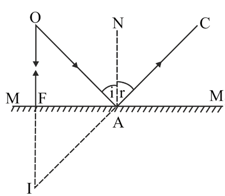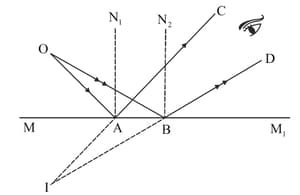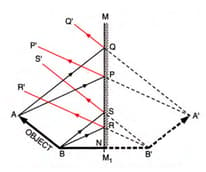Reflection of Light
Reflection of Light: Overview
This topic discusses reflection, where a ray of light falls on a surface and gets reflected. As per its law, the incident ray, the reflected ray and the normal lie in the same plane and the angle of incidence is equal to the angle of reflection.
Important Questions on Reflection of Light
A person has wide face and his two eyes are separated by . The minimum width (in ) of a mirror required for the person to view his complete face is :
A point source of light forms only the umbra region on the screen of a shadowed object.
Among the following an example for extended source of light is
Following are the examples for point sources of light.
What is the nature of an image formed by a plane mirror when an extended object of height h is placed in front of the mirror?
The given below diagram shows the formation of image of point object due to reflection at a plane mirror, Here _____.

A point object can be considered as the source of light.
Extended objects can be considered as the group of point objects in a ray diagram.
A ray of light is incident on a plane mirror and the angle of reflection is . Calculate the angle between the incident ray and the reflected ray.
Assertion(A): The formula connecting and for a spherical mirror is valid in all situations for all spherical mirrors for all positions of the object.
Reason (R): Laws of reflection are strictly valid for plane surfaces.
The incident ray, reflected ray and _____ at the point of incidence lie in the same plane.
Angle of incidence is always equal to the angle of _____ for opaque surfaces.
The incident ray, reflected ray and normal at the point of incidence lie in the same plane.
The angle of incidence is always equal to the angle of reflection.
The incident ray, reflected ray and normal do not lie in the plane of reflection is called plane of reflection.
The plane in which the incident ray, reflected ray and normal lie is the plane of reflection.


